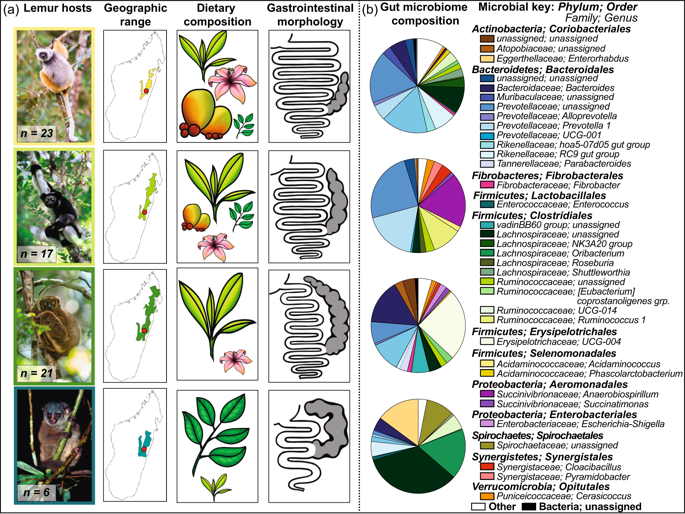Our official English website, www.x-mol.net, welcomes your
feedback! (Note: you will need to create a separate account there.)
A role for gut microbiota in host niche differentiation.
The ISME Journal ( IF 10.8 ) Pub Date : 2020-04-01 , DOI: 10.1038/s41396-020-0640-4 Lydia K Greene 1, 2, 3 , Cathy V Williams 4, 5 , Randall E Junge 5, 6 , Karine L Mahefarisoa 5, 7 , Tsiky Rajaonarivelo 5, 8 , Hajanirina Rakotondrainibe 5 , Thomas M O'Connell 9 , Christine M Drea 1, 2, 10
The ISME Journal ( IF 10.8 ) Pub Date : 2020-04-01 , DOI: 10.1038/s41396-020-0640-4 Lydia K Greene 1, 2, 3 , Cathy V Williams 4, 5 , Randall E Junge 5, 6 , Karine L Mahefarisoa 5, 7 , Tsiky Rajaonarivelo 5, 8 , Hajanirina Rakotondrainibe 5 , Thomas M O'Connell 9 , Christine M Drea 1, 2, 10
Affiliation

|
If gut microbes influence host behavioral ecology in the short term, over evolutionary time, they could drive host niche differentiation. We explored this possibility by comparing the gut microbiota of Madagascar's folivorous lemurs from Indriidae and Lepilemuridae. Occurring sympatrically in the eastern rainforest, our four, target species have different dietary specializations, including frugo-folivory (sifakas), young-leaf folivory (indri and woolly lemurs), and mature-leaf folivory (sportive lemurs). We collected fecal samples, from 2013 to 2017, and used amplicon sequencing, metagenomic sequencing, and nuclear magnetic resonance spectroscopy, respectively, to integrate analyses of gut microbiome structure and function with analysis of the colonic metabolome. The lemurs harbored species-specific microbiomes, metagenomes, and metabolomes that were tuned to their dietary specializations: Frugo-folivores had greater microbial and metagenomic diversity, and harbored generalist taxa. Mature-leaf folivores had greater individual microbiome variation, and taxa and metabolites putatively involved in cellulolysis. The consortia even differed between related, young-leaf specialists, with indri prioritizing metabolism of fiber and plant secondary compounds, and woolly lemurs prioritizing amino-acid cycling. Specialized gut microbiota and associated gastrointestinal morphologies enable folivores to variably tolerate resource fluctuation and support nutrient extraction from challenging resources (e.g., by metabolizing plant secondary compounds or recalcitrant fibers), perhaps ultimately facilitating host species' diversity and specialized feeding ecologies.
中文翻译:

肠道微生物群在宿主生态位分化中的作用。
如果肠道微生物在短期内影响宿主的行为生态,那么在进化过程中,它们可能会推动宿主生态位的分化。我们通过比较来自 Indriidae 和 Lepilemuridae 的马达加斯加叶狐猴的肠道微生物群来探索这种可能性。我们的四个目标物种同域分布在东部雨林中,具有不同的饮食特性,包括果叶狐猴(sifakas)、幼叶叶猴(indri 和长毛狐猴)和成熟叶叶猴(运动狐猴)。我们收集了 2013 年至 2017 年的粪便样本,并分别使用扩增子测序、宏基因组测序和核磁共振波谱,将肠道微生物组结构和功能的分析与结肠代谢组的分析结合起来。狐猴拥有物种特异性的微生物组、宏基因组和代谢组,这些微生物组、宏基因组和代谢组都根据它们的饮食专门化进行了调整:果叶动物具有更大的微生物和宏基因组多样性,并拥有通用类群。成熟叶食叶动物具有更大的个体微生物组变异,并且推测与纤维素分解有关的类群和代谢物。该联盟甚至在相关的幼叶专家之间也存在差异,indri优先考虑纤维和植物次生化合物的代谢,而毛狐猴优先考虑氨基酸循环。专门的肠道微生物群和相关的胃肠道形态使食叶动物能够不同程度地耐受资源波动,并支持从具有挑战性的资源中提取营养(例如,通过代谢植物次生化合物或顽固纤维),也许最终促进宿主物种的多样性和专门的摄食生态。
更新日期:2020-04-01
中文翻译:

肠道微生物群在宿主生态位分化中的作用。
如果肠道微生物在短期内影响宿主的行为生态,那么在进化过程中,它们可能会推动宿主生态位的分化。我们通过比较来自 Indriidae 和 Lepilemuridae 的马达加斯加叶狐猴的肠道微生物群来探索这种可能性。我们的四个目标物种同域分布在东部雨林中,具有不同的饮食特性,包括果叶狐猴(sifakas)、幼叶叶猴(indri 和长毛狐猴)和成熟叶叶猴(运动狐猴)。我们收集了 2013 年至 2017 年的粪便样本,并分别使用扩增子测序、宏基因组测序和核磁共振波谱,将肠道微生物组结构和功能的分析与结肠代谢组的分析结合起来。狐猴拥有物种特异性的微生物组、宏基因组和代谢组,这些微生物组、宏基因组和代谢组都根据它们的饮食专门化进行了调整:果叶动物具有更大的微生物和宏基因组多样性,并拥有通用类群。成熟叶食叶动物具有更大的个体微生物组变异,并且推测与纤维素分解有关的类群和代谢物。该联盟甚至在相关的幼叶专家之间也存在差异,indri优先考虑纤维和植物次生化合物的代谢,而毛狐猴优先考虑氨基酸循环。专门的肠道微生物群和相关的胃肠道形态使食叶动物能够不同程度地耐受资源波动,并支持从具有挑战性的资源中提取营养(例如,通过代谢植物次生化合物或顽固纤维),也许最终促进宿主物种的多样性和专门的摄食生态。











































 京公网安备 11010802027423号
京公网安备 11010802027423号